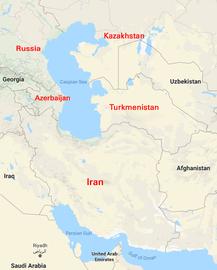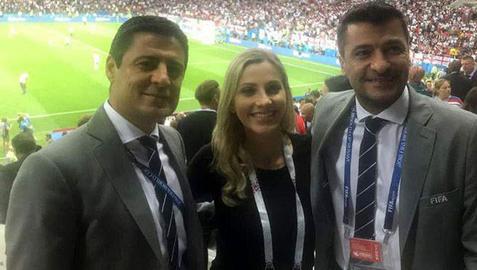Russian President Vladimir Putin has signed an order approving the draft Convention on the Legal Status of the Caspian Sea. As the official Iranian news agency Islamic Republic News Agency reported quoting the Russian news agency Interfax [Persian link], the order declares that Russia is ready to sign the final agreement during the next meeting between the heads of the Caspian Sea littoral states.
If other littoral states including Iran sign the convention then the legal disputes over the Caspian Sea that started nearly four decades ago with the collapse of the Soviet Union will be resolved.
Some reports say the summit between the Caspian states may take place in the second half of this year. In addition to Iran and Russia, which shared sovereignty over the Caspian Sea during the days of the Soviet Union, heads of the three new littoral states — the Republic of Azerbaijan, Kazakhstan and Turkmenistan — must also sign the convention for it to take effect.
All of five states are hoping to claim a larger share of the Caspian Sea as their territories. A bigger share means not only a larger territory, but also more riches from vast offshore petroleum reserves and fishing. Apart from the occupation of Iranian land during the 1980-88 war with Iraq, the division of the Caspian Sea has been the single most important issue for Iran over the last almost 50 years when it comes to sovereignty and territorial integrity.
“Practically Ready”?
The states have been negotiating over the legal status of their claims for the last 27 years. Although there have been no recent signs that these countries have resolved their differences, in December 2017, Russian Foreign Minister Sergey Lavrov unexpectedly announced that the five Caspian states had agreed on "all the outstanding key issues" regarding the legal status of the Caspian Sea, adding that the draft text of the Convention on the Legal Status of the Caspian Sea was "practically ready" to be signed.
Lavrov’s announcement followed a meeting with foreign ministers from Azerbaijan, Iran, Kazakhstan, and Turkmenistan but, since then, no details have been published regarding the resolution of outstanding issues. None of the other four countries have confirmed Lavrov’s claim and Iranian Foreign Minister Mohammad Javad Zarif has been silent on the issue. However, on December 15, 2017, Iranian foreign ministry spokesman Bahram Ghasemi not only denied that a final agreement had been reached, he also made it clear that the issue had not even been on the agenda at the foreign ministers meeting [Persian link].

A Sea or a Lake?
So why has the dispute dragged on for almost three decades? After the collapse of the Soviet Union, three new littoral states declared their independence. As a result, the sovereignty of the Caspian Sea that had been shared between the Soviet Union and Iran had to be renegotiated. The Caspian is not an “open” sea in the conventional sense and international laws offer no guidelines or precedents for it being shared between countries. With an area of 371,000 square kilometers, the Caspian Sea is the largest enclosed inland body of water in the world. It is called a “sea” but it is actually a lake without access to international waters. The three littoral states of Kazakhstan, the Republic of Azerbaijan and Turkmenistan refer to the Caspian as a “sea” and, therefore say it falls under laws and conventions governing international waters, including the 1982 United Nations Convention on the Law of the Sea. According to this interpretation, ships belonging to countries other than the littoral states have the right to enter the Caspian Sea. But Russia and Iran staunchly oppose this view because they fear that it would allow the US Navy access to the body of water.
Iran and Russia assert that the Caspian Sea is a lake. Up to now, this view has been the framework for negotiations to define the new legal status of the Caspian. But for Iran, there is a flip side to this position that makes the achievement of its other claims difficult: Because of the elongated shape of the Caspian Sea, Iran would be entitled to the smallest share among the littoral states — around 11 percent in the worst case scenario and less than 20 percent in the best case.
For years, Iran demanded sharing of the Caspian Sea on an “equitable” basis, but after other littoral states practically divided up the sea through bilateral agreements it had no choice but to find another solution.
A Questionable Claim
Iran’s demands for an equitable sharing is not limited to the water of the Caspian Sea. The proposed arrangement also includes the Caspian's underwater riches of petroleum reserves and fishing. Now Iran wants 20 percent of these resources, but the Azerbaijan government does not agree; it has its own claims. Considering these serious differences, it is not clear how the draft convention signed by Vladimir Putin has resolved these disputes.
The only existing agreement on the Caspian Sea was signed four years ago by the heads of the five littoral states in the Russian city of Astrakhan. According to this agreement [Persian link], each country rules over 15 nautical miles of territorial waters and has a monopoly on fishing for an additional 10 miles. The remaining parts of the Caspian were declared open to all littoral states. But the rules governing the exploitation of underwater petroleum reserves remained — and remain — unclear.
Now that the US has withdrawn from the nuclear agreement, Iran needs Russia’s support in the international community more than ever. And this has led to deep concerns that the Islamic Republic might be forced to give in to Russian demands that go against Iranian sovereignty and interests in the Caspian Sea.
visit the accountability section
In this section of Iran Wire, you can contact the officials and launch your campaign for various problems

























comments